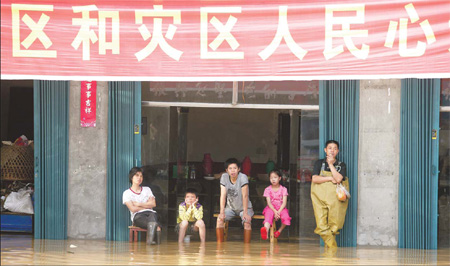Farmers choose to live or die with their homes
Great escape
Foreseeing the problem, authorities sent letters to residents warning them about the flood dangers from the coming rain. But when it came to carrying out the rescue plan, soldiers and cadres said much of the resistance was from elderly people.
 |
|
Residents in Changkai, eastern Jiangxi province, wait for the floodwaters to disappear. The town was soaked for about a week after the nearby Fuhe River burst its banks on June 21. |
"We don't want to leave," said Wang Rixi, the 67-year-old gatekeeper at Changkai's elementary school, who lives with his wife, Liu Danglu, 61, and their two grandchildren. "We're fine here. We have plenty of rice and drinking water."
The family had been holed up in a second-floor classroom for several days by the time a rescue team arrived.
When asked if they were afraid, the two youngsters firmly shook their heads. Like other children in the town, this is their first flood experience as they are too young to remember the last time the dike was breached in 1982.
"My son and daughter-in-law (who work away) keep asking me to get out (of the flood zone) with the children but I'd rather stay," said Wang Rixi, who eventually relented and was carried to a boat on the shoulders of a soldier. In his hands were bags stuffed with blankets and clothes.
With power supplies and telephone lines disrupted by the deluge, residents working outside of the area found it difficult to get in touch with loved ones back home. Instead, they bombarded cadres with calls for information.
"People have called me many times to ask us to bring their relatives back," said village head Liu. "But when we get there, they refuse to leave."
Liu Yang, a 21-year-old college student from the East China Institute of Technology, who stood on a bank watching the evacuation, said he used to be a soldier but could understand why residents are reluctant to leave their homes.
"The chickens, cows and horses, even the blankets, they all mean a lot to these people," he said. "They can't just leave them there."
In one case, soldiers had to help a resident move his refrigerator upstairs before he would agree to leave. "Some villagers even asked us to ship their pigs out of the flood zone," said soldier Wang Ji.
Once out of the dangerous area, residents were transported to one of about 20 makeshift evacuations centers - mostly schools with dormitories - in Fuzhou, a city 20 km south of Changkai in Jiangxi.
Meteorological reports suggest the worst of the rain is over, but before people began to filter back to the affected towns over the weekend, the centers housed more than 35,000 flood victims. Many others stayed with relatives.
Each person was given mats to sleep on, blankets, food and drinking water. However, many of those evacuated said they were anxious to return home.
"Recent days have been sunny and the water level has dropped, so local villagers know the flood is retreating and can't wait to get back," said Bao Guohua, an official with Fuzhou Intermediate People's Court, who was helping with the evacuation.
"But it's not just about protecting property or money," said Wang Fuying, 45, whose house sits just beyond the flood zone in Changkai. "I'd definitely stay in my home. There are so many people (at the evacuation centers). It's not convenient to shower or go to the bathroom. And you have no idea how long you are going to stay there."
Work on repairing the damaged dike, which stretches for 347 meters, was blocked at 6:16 pm on Sunday, three days ahead of schedule, according to the Fuzhou flood control and drought relief office.
An official with the city's publicity department said no casualties have been reported from the flood and added that efforts to prevent the spread of an epidemic will begin this week. As residents return to clean up the mess, though, one of the biggest problems they face is salvaging the crops planted in 9,000 hectares of farmland that, for the last several days, was deep underwater.
 0
0 






